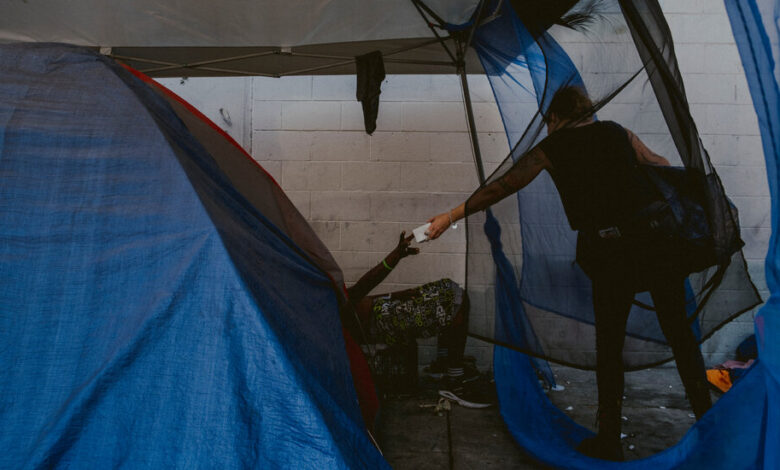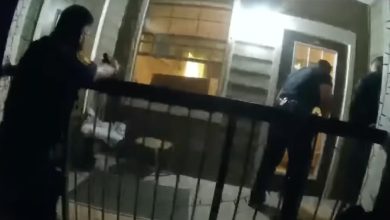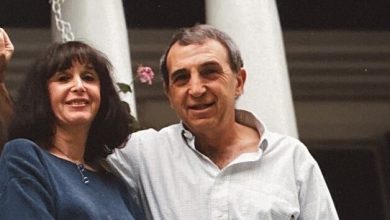Governor Newsom Vetoes Bill for Drug-Injection Sites in California

LOS ANGELES — Gov. Gavin Newsom vetoed legislation on Monday that would have allowed some California cities to open supervised drug-injection sites as part of a pilot program meant to stem a rushing tide of fatal overdoses.
“I have long supported the cutting edge of harm reduction strategies,” he said in a veto letter. “However, I am acutely concerned about the operations of safe injection sites without strong, engaged local leadership and well-documented, vetted, and thoughtful operational and sustainability plans.”
Mr. Newsom added that he was worried about “a world of unintended consequences” that could result from authorizing an unlimited number of sites. He directed the state’s secretary of health and human services to work with local leaders to set statewide operating standards for such facilities.
The proposal would have made the nation’s most populous state home to its broadest experiment with supervised injection sites, where people who use illegal drugs could do so under the watch of staff members who are trained to intervene in overdoses.
When the bill was approved by the state’s Democratic-controlled legislature earlier this month, it received fewer votes in favor than would be needed to override a veto.
The governor’s decision on whether to sign or veto the bill was closely watched as a signal of his political ambitions beyond California.
Mr. Newsom, a Democrat, has built a national profile as an outspoken defender of popular progressive causes like abortion rights and gun control. But political observers speculated that he would be hesitant to sign the injection-site bill, which might have yielded potent fodder for his conservative critics if it had become law.
“He likes to be ahead of the curve,” Jessica Levinson, a political analyst who teaches at Loyola Law School in Los Angeles, said of Mr. Newsom recently. “But if he signs this, the ads kind of write themselves: He becomes ‘Governor Heroin.’”
Supporters of the measure, including local elected officials, said that the synthetic opioid fentanyl was driving the worst overdose crisis in American history, one that has become closely entwined with California’s catastrophic housing emergency. They said the bill offered Mr. Newsom a chance to save thousands of lives while also saving taxpayers the cost of many ambulance rides and emergency room visits.
The bill would have allowed the cities of San Francisco, Los Angeles and Oakland, as well as Los Angeles County, to set up supervised injection facilities in communities that were already struggling with open drug use and frequent overdoses. At the centers, drug users would be offered supplies like clean needles, and could be connected with treatment services.
Read More on the Newsom Administration
- Injection-Site Bill: Gov. Gavin Newsom vetoed a bill for supervised drug-injection sites in California, saying the state was not ready to put the idea into practice.
- Abortion: With the end of Roe v. Wade, Mr. Newsom vowed to “fight like hell” for abortion rights. His state is also looking to enshrine those rights in its constitution.
- A Message for Hollywood: The governor has called on film companies to “walk the walk” on liberal values by stopping filming in conservative states such as Georgia and Oklahoma.
- Hardball Tactics: Embracing a fight-fire-with-fire approach against Republicans, Mr. Newsom has enforced bans on assault weapons and ghost guns that co-opt a Texas anti-abortion tactic.
In 2018, as he campaigned for governor, Mr. Newsom said he was “very, very open” to an injection-site pilot project, according to The San Francisco Chronicle. But he did not signal his position on this year’s proposal until his announcement on Monday.
Opponents of the proposal, including Republican state lawmakers and some law enforcement groups, argued that setting up the sites would encourage illicit drug use while failing to require users to seek treatment.
“People struggling with addiction need help, not a legal place to shoot up,” Scott Wilk, the State Senate’s Republican leader, said in a statement on Monday.
Mr. Newsom’s predecessor, Jerry Brown, a fellow Democrat, vetoed a similar bill in 2018, saying that without a requirement for treatment, the sites would not reduce drug use.
For years, California has watched other parts of the country take the lead on the idea. New York City opened the nation’s first municipal supervised drug-injection sites late last year; in April, Rhode Island became the first state to make such sites legal statewide.
Cities from Seattle to Philadelphia have made plans to open supervised injection sites. The nonprofit group that was set to open the Philadelphia center was sued by the Trump administration, but Biden administration officials are now discussing a settlement of the case, signaling openness to the idea at the federal level.
Scott Wiener, the California lawmaker who wrote the bill that Mr. Newsom rebuffed on Monday, said that it might be uncomfortable for the governor to see the Biden administration advance a more progressive drug policy than his famously liberal home state.
He described the veto as a tragic missed opportunity to better address one of the state’s most pressing problems.
The proposal was “not a radical bill by any stretch of the imagination,” Mr. Wiener said in a statement on Monday. “We don’t need additional studies or working groups to determine whether safe consumption sites are effective. We know from decades of experience and numerous peer-reviewed scientific studies that they work.”
He called the veto “a major setback,” but said he and other legislators would continue to press for the state to “focus on drug use and addiction as the health issues that they are.”
The governor said in his veto letter that he was open to future legislation that would allow a “truly limited pilot program.”
Mr. Newsom is running for re-election this year, and is expected to win easily, after defeating a recall attempt in 2021. His strong position has allowed him to devote more time and resources to other matters.
He prompted speculation about his presidential ambitions when he purchased ads in Florida and Texas criticizing those states’ Republican governors. After Roe v. Wade was overturned, Mr. Newsom issued a “wake-up call” to his own party about the erosion of rights at the hands of a more disciplined, better-organized G.O.P.
Though Mr. Newsom has so far strenuously denied that he is interested in a 2024 presidential run, a recent poll found that he would be a leading contender — at least, among Californians.
According to the poll, released last week by the Berkeley Institute of Governmental Studies, nearly two-thirds of California voters did not want President Biden to seek a second term. Mr. Newsom and Senator Bernie Sanders of Vermont, who finished first in California’s 2020 Democratic presidential primary, were tied as the top candidates to replace the president on the ticket if he doesn’t run. Vice President Kamala Harris, another Californian, came in third.
On Monday, a spokesman for Mr. Newsom’s campaign, Nathan Click, again denied that the governor had any interest in running for president.





